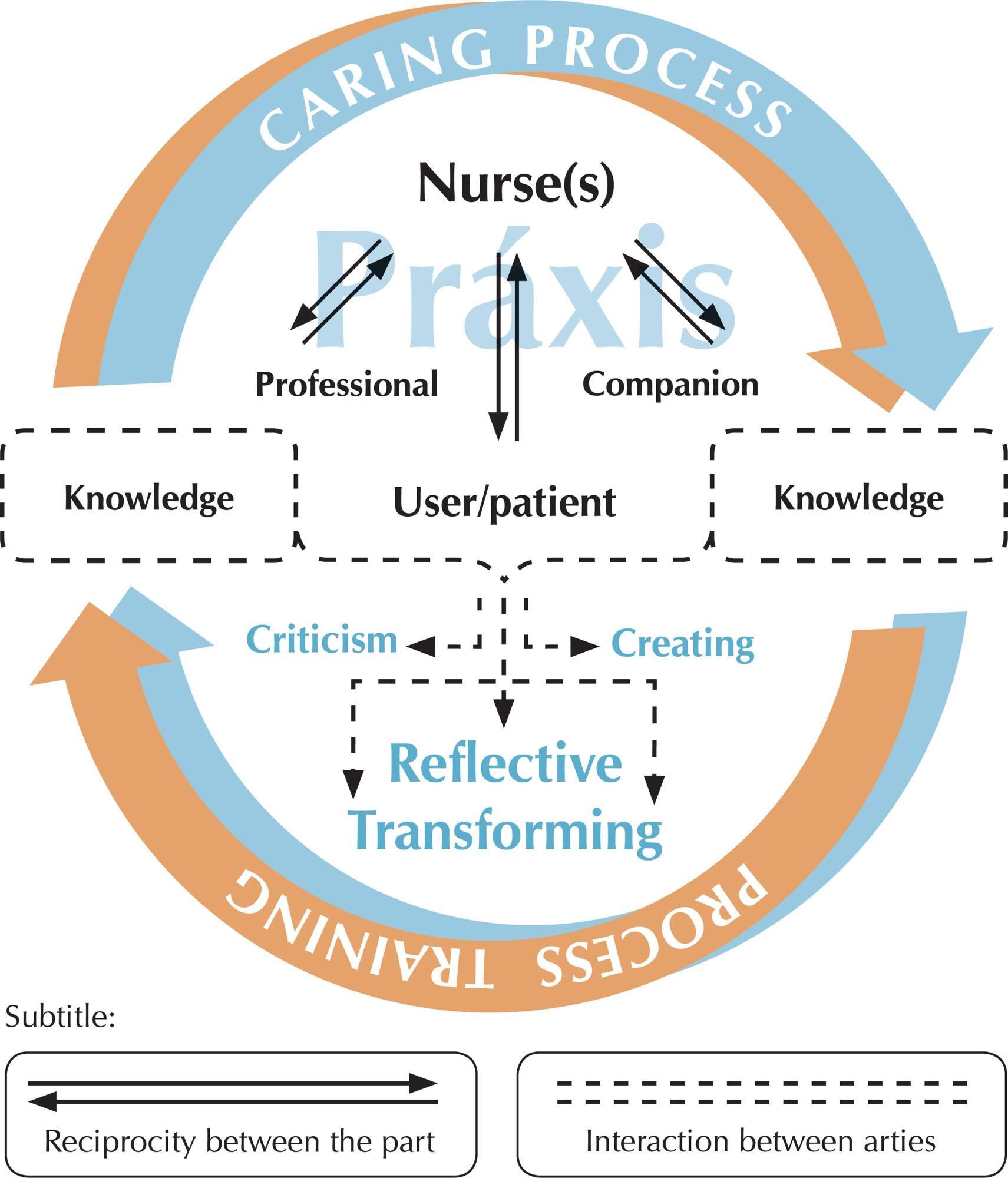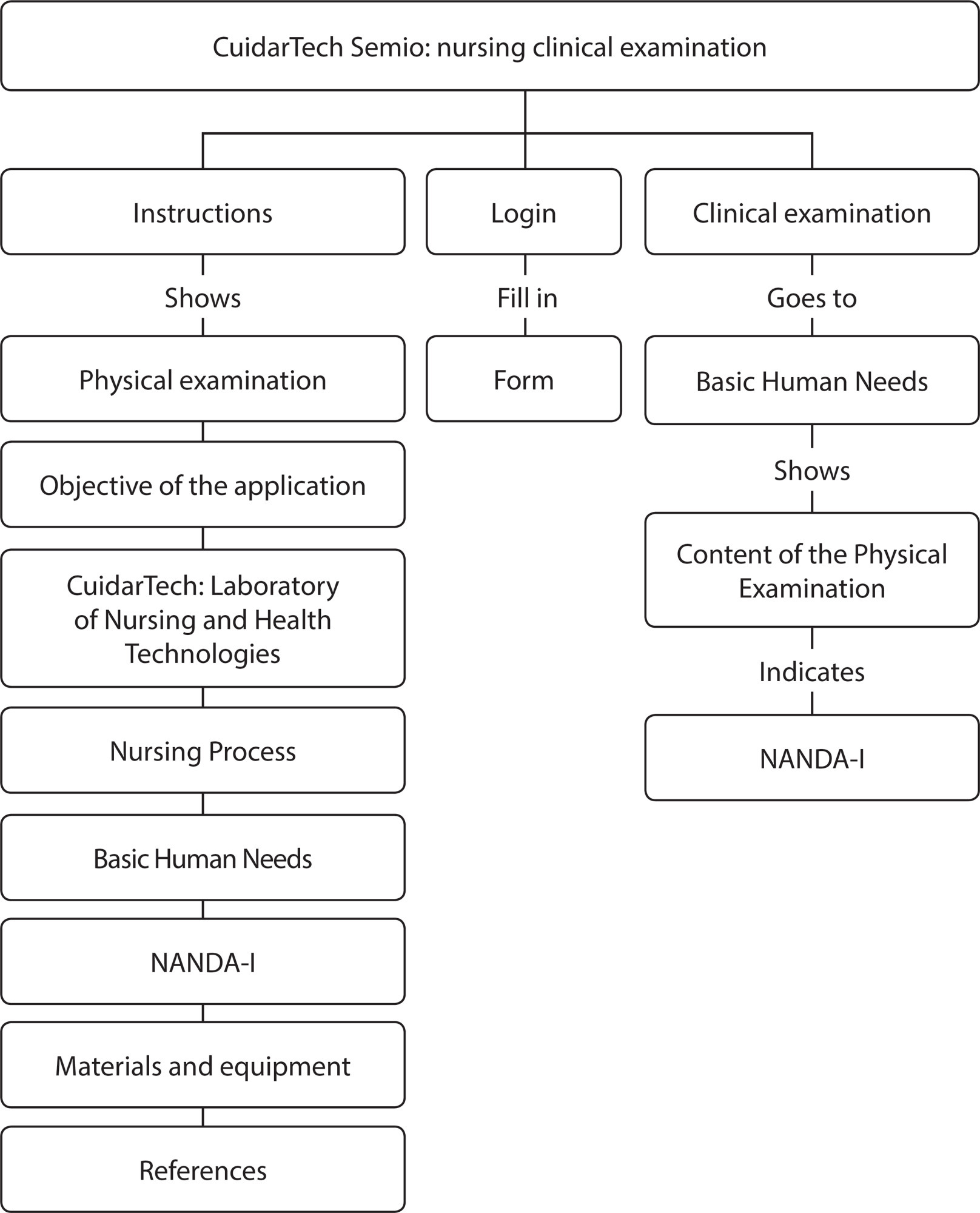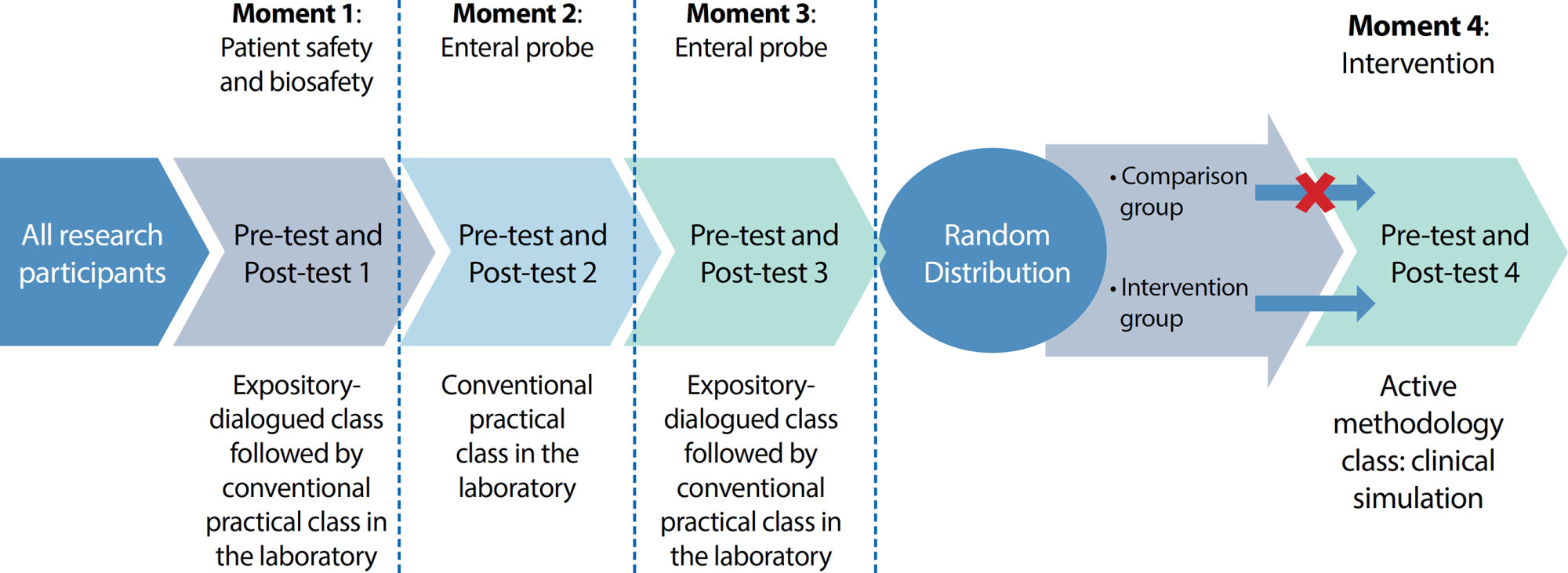-
RESEARCH01-01-2018
Construction and validation of a distance Basic Life Support Course
Revista Brasileira de Enfermagem. 2018;71:2698-2705
Abstract
RESEARCHConstruction and validation of a distance Basic Life Support Course
Revista Brasileira de Enfermagem. 2018;71:2698-2705
DOI 10.1590/0034-7167-2018-0122
Views0See moreABSTRACT
Objective:
to describe the content construction and validation process of the Distance Education Basic Life Support Course.
Method:
methodological study, developed through literature review, outlined in the light of the Bloom’s Taxonomy and Ausubel’s Meaningful Learning Theory. For validation, the analysis was performed with judges, using a structured tool.
Results:
the construction of the distance course was complex and challenging, since it was tried to develop it with logical-methodological coherence, considering the constructivist perspective, representing an advance in the process of dissemination of the Urgency and Emergency teaching culture. As for the content validation process, it was verified that of the 16 suggestions made by the judges, 14 were accepted and two rejected.
Conclusion:
the course had its contents validated by experts.
-
RESEARCH01-01-2018
Needs, expectations and care production of people in street situation
Revista Brasileira de Enfermagem. 2018;71:2689-2697
Abstract
RESEARCHNeeds, expectations and care production of people in street situation
Revista Brasileira de Enfermagem. 2018;71:2689-2697
DOI 10.1590/0034-7167-2017-0612
Views0See moreABSTRACT
Objective:
To understand the needs, expectations, and care production of people in street situations.
Method:
This is a qualitative study based on social phenomenology, conducted with eight people in street situations. Data were collected through a phenomenological interview from September to December, 2016.
Results:
The needs of participants refer to survival and access to health services. Care production involves physico-biological, spiritual, and affective-social aspects. The expectations of these people involve a desire for health care that considers their singularities and offers them social apparatuses.
Final considerations:
This study has contributions to the practice, training on health, and nursing in collective health, regarding care planning and provision to the population in street situations based on their expectations and lifestyles, considered as tools to help fulfill the health needs of this social group.
-
RESEARCH01-01-2018
Integrative and complementary practices: use by community health agents in self-care
Revista Brasileira de Enfermagem. 2018;71:2682-2688
Abstract
RESEARCHIntegrative and complementary practices: use by community health agents in self-care
Revista Brasileira de Enfermagem. 2018;71:2682-2688
DOI 10.1590/0034-7167-2018-0078
Views0See moreABSTRACT
Objective:
To verify the use of integrative and complementary practices (ICPs) by community health agents working in family health teams.
Methods:
Cross-sectional, quantitative research, conducted in the city of Montes Claros, Minas Gerais. An structured form was used for the characterization of participants and use of ICPs. Descriptive and bivariate analyses were conducted.
Results:
Use of ICPs was referenced by 94 (40.7%) agents. The use of medicinal plants was predominant (32.5%). There were associations between: ICPs in general and negative self-perception of health (p=0.032), homeopathy and higher education (p=0.015), massage and living with partner(p=0.024), chiropractic care and income equal to or greater than four minimum wages (p=0.031), relaxation/meditation and religion (p=0.028).
Conclusion:
The use of ICPs was verified in the healthcare of community agents. It is necessary to strengthen these practices for the promotion of health and prevention of diseases.
-
RESEARCH01-01-2018
Assessment of the product of nursing care in specialized hospitals
Revista Brasileira de Enfermagem. 2018;71:2675-2681
Abstract
RESEARCHAssessment of the product of nursing care in specialized hospitals
Revista Brasileira de Enfermagem. 2018;71:2675-2681
DOI 10.1590/0034-7167-2017-0354
Views0See moreABSTRACT
Objective:
To evaluate the product of care in units of specialized hospitals, identifying the items that most contributed to the score; to compare the product of care among hospitals, units, and shifts; to verify the association between demographic and professionals variables and the product of care.
Method:
Descriptive study, conducted in eight units of two specialized hospitals in the State of São Paulo. The evaluation of the product of care was performed by applying an instrument to 44 nurses.
Results:
“Multidisciplinary interaction and performance” obtained the lowest median in both hospitals, and the “Meeting assistance needs” and “Nursing care planning” were the better assessed ones. “Dimensioning of nursing staff” was the item that most contributed to the total score. There was a weak correlation between socio-demographic variables and score.
Conclusion:
The product of care, as found in both hospitals, was predominantly considered “good.” The tool enabled the identification of critical aspects of the nursing work.
-
RESEARCH01-01-2018
Care-educational technologies: an emerging concept of the praxis of nurses in a hospital context
Revista Brasileira de Enfermagem. 2018;71:2666-2674
Abstract
RESEARCHCare-educational technologies: an emerging concept of the praxis of nurses in a hospital context
Revista Brasileira de Enfermagem. 2018;71:2666-2674
DOI 10.1590/0034-7167-2017-0753
Views0See moreABSTRACT
Objective:
to know the praxis of nurses in the hospital context and, from this, to define a concept about Care-Educational Technologies.
Method:
qualitative, exploratory-descriptive research, developed in a university hospital in Rio Grande do Sul State, Brazil, with 21 nurses (non-probabilistic sampling), through non-participant observation and semi-structured interview, conducted from March to December 2015. Records were analyzed through content analysis.
Results:
the results showed that in the context of nurses’ work, it is possible to deduce care-educational possibilities, based on the person-person, person-tool and/or person-universe relationship. The concept was defined based on the intertwining of caring-training and training-caring for oneself and other people.
Final considerations:
the reflections point to the need to develop or strengthen the autonomy of those involved in the health-disease process. This is based on the empowerment of people under their lives’ conditions, in their multidimensionality, within human praxis.

-
RESEARCH01-01-2018
The production of care in the routine of Family Health Teams
Revista Brasileira de Enfermagem. 2018;71:2659-2665
Abstract
RESEARCHThe production of care in the routine of Family Health Teams
Revista Brasileira de Enfermagem. 2018;71:2659-2665
DOI 10.1590/0034-7167-2017-0595
Views0See moreABSTRACT
Objective:
To identify the factors interfering in the production of care in the daily work of health professionals from the Primary Health Care.
Method:
Qualitative research carried out with Family Health Strategy (FHS) teams, in the health units of Rocinha (Rocinha is a favela located in the South Zone of the city of Rio de Janeiro, Brazil). To analyze the data, the thematic network proposed by Attride-Stirling was used.
Results:
The routine of Teams in the Production of Care was the denomination of the network formed by the following themes: scales of services of the teams; structural problems of Family Health Units; standardization of protocols; challenges for the production of care; and collections of micro and macro management.
Final considerations:
The production of care by Family Health Teams is challenged when they take care beyond what is imposed in the organizational protocols of the FHS, reflecting the complexity of working and caring in territories with social disparities.

-
RESEARCH01-01-2018
Formation and disruption of bonds between caregivers and institutionalized children
Revista Brasileira de Enfermagem. 2018;71:2650-2658
Abstract
RESEARCHFormation and disruption of bonds between caregivers and institutionalized children
Revista Brasileira de Enfermagem. 2018;71:2650-2658
DOI 10.1590/0034-7167-2017-0844
Views0See moreABSTRACT
Objective:
to understand the perspective of caregivers about the formation and disruption of bonds with institutionalized children.
Method:
a qualitative research that used as a theoretical framework the Attachment Theory and the Symbolic Interactionism, and the Grounded Theory as methodological framework. Participating in the study were 15 female caregivers of children aged zero to three years, from a child care institution in the south of Brazil, from April to July 2015.
Results:
three categories were elaborated: “Experiencing the formation of bond and attachment”; “Disrupting with the established bonds and detaching”; “Learning how to work with formation and disruption of bond”.
Final considerations:
we need to think of ways to minimize the negative effects formation and disruption of bonds. In this sense, active listening and the offer of psychological support favor the sharing of experiences and the emotional strengthening of the female caregivers.
-
RESEARCH01-01-2018
Nursing care practices for people with Chronic Noncommunicable Diseases
Revista Brasileira de Enfermagem. 2018;71:2643-2649
Abstract
RESEARCHNursing care practices for people with Chronic Noncommunicable Diseases
Revista Brasileira de Enfermagem. 2018;71:2643-2649
DOI 10.1590/0034-7167-2017-0799
Views0See moreABSTRACT
Objective:
To understand care practices for people with Chronic Noncommunicable Disease, developed by Primary Health Care nurses in a municipality in southern Brazil.
Method:
Qualitative study, developed through the Discourse of the Collective Subject. Twenty-three nurses from the Family Health Strategy participated. Data were collected through semi-structured interviews and analyzed by the health promotion framework.
Results:
Nurses care practices for people with chronic disease present themselves through the home visit, individual care and collective care. These, eventually, have an extended character, advocating the promotion of health, at other times it is restrictive, returning to be a traditional and biologicalist practice.
Final considerations:
The nurse acts in a diversified way in this field, being present in the lives of people with chronic diseases. However, it is necessary to move forward, especially in the search for the constant and continuous development of an extended and welcoming care practice.
-
ORIGINAL ARTICLE12-21-2020
Construction and validation of a mobile application for development of nursing history and diagnosis
Revista Brasileira de Enfermagem. 2020;73:e20190674
Abstract
ORIGINAL ARTICLEConstruction and validation of a mobile application for development of nursing history and diagnosis
Revista Brasileira de Enfermagem. 2020;73:e20190674
DOI 10.1590/0034-7167-2019-0674
Views0See moreABSTRACT
Objectives:
to describe the construction and validation process for a mobile application for development of the nursing history and diagnosis.
Methods:
methodological study conducted in 2018 in three stages: content creation, based on the Basic Human Needs categories and nursing diagnoses; content assessment by nine nursing judges, with calculation of the content validity index; and construction of the application, which included definition of the requirements, a conceptual map, implementation and prototyping options, tests and implementation.
Results:
the application was organized by sections: Grouped Basic Human Needs, Cranial pair tests, Clinical assessment scales and Additional tests. Two section were adjusted according to the judges’ suggestions.
Final Considerations:
it is the first application produced in Brazil based on the Basic Human Need categories, which enables quick access to information, concepts and typical nomenclatures of semiology, recording of clinical data and definition of nursing diagnoses.

-
ORIGINAL ARTICLE10-21-2019
Caring ability, burden, stress and coping of family caregivers of people in cancer treatment
Revista Brasileira de Enfermagem. 2019;72(6):1541-1546
Abstract
ORIGINAL ARTICLECaring ability, burden, stress and coping of family caregivers of people in cancer treatment
Revista Brasileira de Enfermagem. 2019;72(6):1541-1546
DOI 10.1590/0034-7167-2018-0605
Views0See moreABSTRACT
Objective:
To analyze the association between the caring ability and the burden, stress and coping of family caregivers of people in cancer treatment.
Method:
A cross-sectional study with 132 family caregivers. The following instruments were applied: a characterization instrument, the Caring Ability Inventory, the Zarit Burden Interview, the Perceived Stress Scale, and the Brief COPE. The Spearman Correlation was used with significance ≤5%.
Results:
There were significant and positive correlations between total caring ability and: burden – interpersonal relationship (p=0.03); stress (p=0.02) and maladaptive coping (p=0.00); and inversely proportional correlations with problem-focused coping (p=0.03). The courage had inversely proportional correlation with: self-efficacy (p=0.03), interpersonal relationship (p=0.00), stress (p=0.04) and maladaptive coping (p=0.00). The knowledge had significant and positive correlation with problem-focused coping (p=0.00), adaptive coping (p=0.01), and inverse correlation with stress (p=0.02).
Conclusion:
The level of caring ability correlates with levels of stress and burden, and with the type of coping strategy used by family caregivers.
-
ORIGINAL ARTICLE10-21-2019
“Waiting for a miracle”: Spirituality/Religiosity in coping with sickle cell disease
Revista Brasileira de Enfermagem. 2019;72(6):1554-1561
Abstract
ORIGINAL ARTICLE“Waiting for a miracle”: Spirituality/Religiosity in coping with sickle cell disease
Revista Brasileira de Enfermagem. 2019;72(6):1554-1561
DOI 10.1590/0034-7167-2018-0635
Views0See moreABSTRACT
Objective:
To understand spirituality/religiosity as experienced by people with sickle cell disease, and its influence on coping with the disease.
Method:
A qualitative, descriptive, and exploratory study conducted in the State of Bahia. Twenty-nine respondents participated in semi-structured interviews. Content analysis was used to analyze the empirical material.
Results:
Individuals with sickle cell disease experience spirituality/religiosity motivated by their hope for a miracle, and fear of death; among their rites are: reading religious materials, individual and group prayer, and attendance at worship services. The effects on their health include: comfort by means of coping by comparing two evils, anxiety relief, social support, and lifestyle changes; however, spirituality/religiosity may be impaired.
Final considerations:
This study demonstrates the need to qualify health professionals to address spiritual issues of these individuals during illness, with the aims of diagnosing suffering and anguish, and providing care, comfort and strengthening of the spiritual bonds of these individuals.
-
ORIGINAL ARTICLE02-10-2020
Depression among nursing students and its association with academic life
Revista Brasileira de Enfermagem. 2020;73(1):e20180173
Abstract
ORIGINAL ARTICLEDepression among nursing students and its association with academic life
Revista Brasileira de Enfermagem. 2020;73(1):e20180173
DOI 10.1590/0034-7167-2018-0173
Views0See moreABSTRACT
Objective:
To measure the levels of depression among Nursing students from a public institution of higher education and the association with aspects of academic life.
Method:
Analytical and quantitative study with 203 students from a higher education institution that uses active methodologies. We used Beck’s Depression Inventory and the Likert type scale of academic factors.
Results:
We verified that 19.2% had moderate or severe levels of depression. Higher levels of depression were associated with female gender (p=0.003), working more than 40 hours per week (p=0.047), spending more than 90 minutes to reach academic activities (p=0.043) and with 12 academic factors specific to routines of the studied institution.
Conclusion:
The results contribute to managers’ and professors’ reflection and analysis concerning nursing students’ mental health, in addition to indicating in which aspects there is a need to provide greater support to these students.
-
ORIGINAL ARTICLE10-01-2022
Factors associated with vulnerability and fragility in the elderly: a cross-sectional study
Revista Brasileira de Enfermagem. 2022;75(2):e20200399
Abstract
ORIGINAL ARTICLEFactors associated with vulnerability and fragility in the elderly: a cross-sectional study
Revista Brasileira de Enfermagem. 2022;75(2):e20200399
DOI 10.1590/0034-7167-2020-0399
Views0See moreABSTRACT
Objectives:
to assess factors associated with vulnerability and fragility in the elderly.
Methods:
crosssectional study with 384 elderly people in Fortaleza, Ceará. The Vulnerable Elders Survey and Clinical-Functional Vulnerability Index – 20 were used. Chi-square and Fisher’s exact tests were used for associations. In the analysis of the combined influence of risk factors, the stepwise logistic regression and multinomial regression methods were adopted.
Results:
251 (65.4%) non-vulnerable and 133 (34.6%) vulnerable elders. From the vulnerable elders analyzed, 42 (30.9%) are at high risk for frailty. Factors associated with vulnerability: age, gender, presence of comorbidities, hypertension, diabetes, osteoporosis and use of polypharmacy. There is a 30% increase in the chance of vulnerability for each additional drug. Physical activity reduces the chance of vulnerability by 60%. Factors associated with frailty: educational level; self-perception of health; comorbidities; polypharmacy.
Conclusions:
it is important to pay attention to the presence of arterial hypertension, osteoporosis, polypharmacy, and encourage the practice of physical activity.
-
ORIGINAL ARTICLE10-18-2022
Clinical simulation as a Nursing Fundamentals teaching method: a quasi-experimental study
Revista Brasileira de Enfermagem. 2022;75(2):e20201155
Abstract
ORIGINAL ARTICLEClinical simulation as a Nursing Fundamentals teaching method: a quasi-experimental study
Revista Brasileira de Enfermagem. 2022;75(2):e20201155
DOI 10.1590/0034-7167-2020-1155
Views0See moreABSTRACT
Objectives:
to evaluate students’ knowledge gain after the implementation of clinical simulation in Nursing Fundamentals disciplines.
Methods:
a quasi-experimental intervention was carried out with 60 students, distributed in comparison and intervention groups, who underwent traditional teaching and traditional teaching associated with simulated teaching, respectively. Pre-test and post-test instruments were applied to both groups.
Results:
after analyzing the students’ performance through the applied instruments, both groups had a cognitive evolution along with the taught content, however, when compared, the intervention group obtained a higher knowledge gain than the comparison group (p = 0.016), demonstrating progressive and increasing improvement with the use of the methodology.
Conclusions:
simulated teaching significantly helps students in gaining technical-cognitive knowledge. Therefore, it is recommended to adhere to the use of this methodology for teaching Nursing Fundamentals.

-
ORIGINAL ARTICLE06-01-2020
Factors associated with occupational stress among nursing professionals in health services of medium complexity
Revista Brasileira de Enfermagem. 2020;73:e20180913
Abstract
ORIGINAL ARTICLEFactors associated with occupational stress among nursing professionals in health services of medium complexity
Revista Brasileira de Enfermagem. 2020;73:e20180913
DOI 10.1590/0034-7167-2018-0913
Views0See moreABSTRACT
Objective:
To analyze the factors associated with occupational stress among nursing workers in health services of medium complexity.
Methods:
Epidemiological, cross-sectional, exploratory study. A randomly selected sample of 126 nursing professionals from medium complexity services in three cities in the state of Bahia (Santo Antônio de Jesus, Feira de Santana and Itabuna) was investigated. Data were collected in 2011 and 2012. The demand-control model proposed by Karasek was used to assess occupational stress. Simultaneous analysis of occupational stressors was performed using Poisson regression with robust variance.
Results:
The prevalence of occupational stress among nursing professionals was 77%. Occupational stress was associated with the professional category of nursing technician (p=0.01).
Conclusion:
The data indicates a concerning situation of exposure to occupational stressors, which requires coping strategies in order to protect the health of the worker.
-
ORIGINAL ARTICLE11-26-2022
Factors associated with suicide ideation of healthcare university students
Revista Brasileira de Enfermagem. 2022;75:e20200982
Abstract
ORIGINAL ARTICLEFactors associated with suicide ideation of healthcare university students
Revista Brasileira de Enfermagem. 2022;75:e20200982
DOI 10.1590/0034-7167-2020-0982
Views0See moreABSTRACT
Objectives:
to analyze the factors associated with suicidal ideation in students from healthcare graduation courses.
Methods:
quantitative, cross-sectional study, with 251 students from the courses of radiology, speech-language therapy, medicine, nutrition, health service management, and nursing, from a federal higher education institution in the Southeast of Brazil. Data were collected from August to October 2019, using an electronic questionnaire.
Results:
the prevalence of suicidal ideation among participants was 26.33%. In the final logistic regression model, only depressive symptoms were associated with suicidal ideation. Having symptoms of depression increased the chances of suicidal ideation 2.6 times.
Conclusion:
the high prevalence of suicidal ideation and its associated factors constitutes a situational diagnosis that demands the elaboration of public and institutional policies, focused on the promotion and attention to the mental health of the students.
Search
Search in:
Nuvem de Tags
Adolescente (85) Atenção Primária à Saúde (239) COVID-19 (91) Criança (91) Cuidados de Enfermagem (269) Educação em Enfermagem (151) Educação em Saúde (139) Enfermagem (930) Enfermagem Pediátrica (86) Estudantes de Enfermagem (77) Estudos de Validação (131) Família (87) Idoso (208) Promoção da Saúde (99) Qualidade de Vida (104) Saúde do Trabalhador (86) Saúde Mental (145) Saúde Pública (82) Segurança do Paciente (150) Tecnologia Educacional (100)



